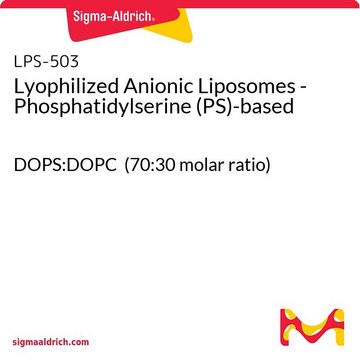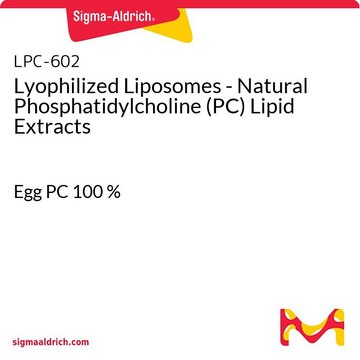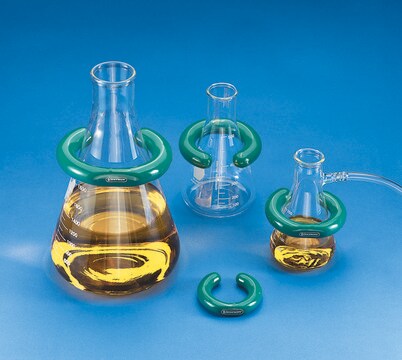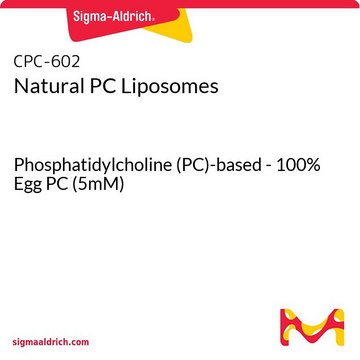LPC-607
Lyophilized Liposomes - Natural Phosphatidylcholine (PC) Lipid Extracts
Egg PC:Cholesterol (70:30 molar ratio)
About This Item
Produits recommandés
Forme
lyophilized powder
Composition
Egg PC:Cholesterol (70:30 molar ratio)
Couleur
white to off-white
Taille moyenne des particules
100 nm
Vous recherchez des produits similaires ? Visite Guide de comparaison des produits
Description générale
Natural Phosphatidylcholine (PC) liposomes are made from natural lipids extracted from egg yolk, soybean, or tissues such as brain, heart, and liver. The Natural PC liposomes are available with and without cholesterol. Adding 30% cholesterol makes the liposomes serum stable and is necessary when the liposomes are used in the presence of serum.
Egg phosphatidylcholine (PC) is composed of both saturated and unsaturated lipids including: 0.2% of the 14:0 lipid, 32.7% 16:0 lipid, 12.3% 18:0 lipid, 1.1% 16:1 lipid, 32% 18:1 lipid, 17.1% 18:2 lipid, 0.2% 20:2 lipid, and 0.3% 20:3 lipid, 2.7% 20:4 lipid and 0.4% 22:6 lipid.
Application
- Liposomes are formed upon hydration of the lyophilized formulation. If the lyophilized liposomes are hydrated with solution containing a water-soluble drug, then a large percentage of the drug will stay outside of the liposomes and in non-encapsulated form. It is advised to use a micro dialysis cassette or a spin column using the right-side beads (depending on the size of your drug) and separate the drug encapsulated liposomes from free drug and perform the drug assay in order to calculate the encapsulation efficiency.
- Lyophilized liposomes are mainly recommended to be used with drugs that have a short life in aqueous solution mainly due to hydrolysis. After adding the solution of the drug to lyophilized liposomes, the liposomes should be used immediately.
- Lyophilized liposomes products should be used by scientists who understand liposome formulation and have the proper equipment in order to check the size, separate the non-encapsulated drug and do the proper assays.
- Trehalose is used as a lyoprotectant in all freeze-dried liposome formulation. The size distribution after hydration of the freeze-dried formulation will be around 100 nm.
- Freeze-dried liposomes should be kept at -20°C.
Code de la classe de stockage
13 - Non Combustible Solids
Classe de danger pour l'eau (WGK)
WGK 3
Faites votre choix parmi les versions les plus récentes :
Certificats d'analyse (COA)
Désolés, nous n'avons pas de COA pour ce produit disponible en ligne pour le moment.
Si vous avez besoin d'assistance, veuillez contacter Service Clients
Déjà en possession de ce produit ?
Retrouvez la documentation relative aux produits que vous avez récemment achetés dans la Bibliothèque de documents.
Notre équipe de scientifiques dispose d'une expérience dans tous les secteurs de la recherche, notamment en sciences de la vie, science des matériaux, synthèse chimique, chromatographie, analyse et dans de nombreux autres domaines..
Contacter notre Service technique








